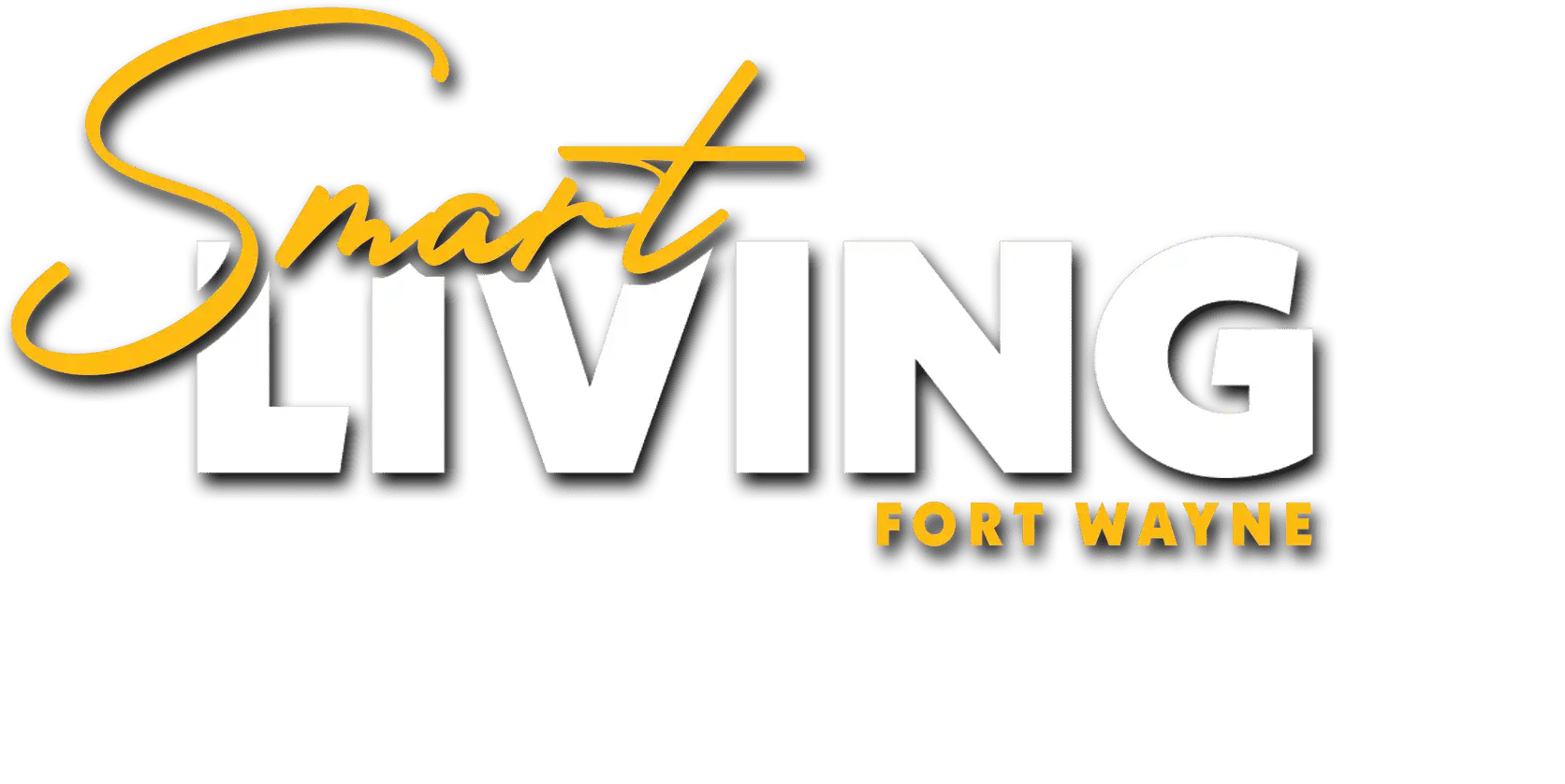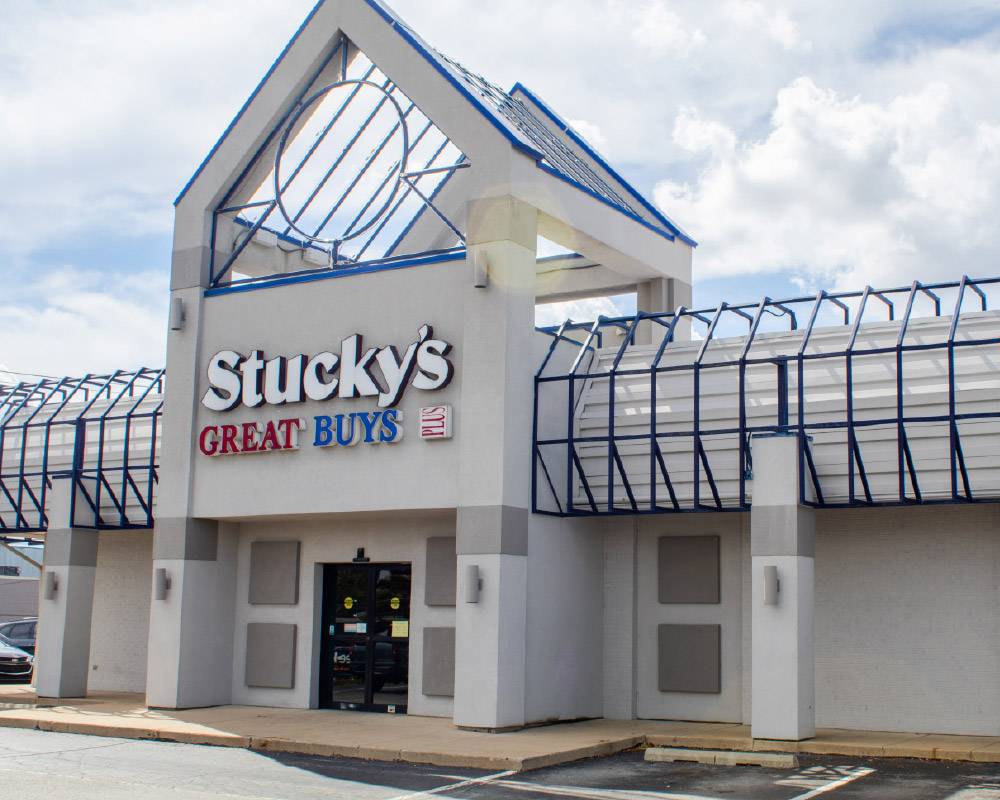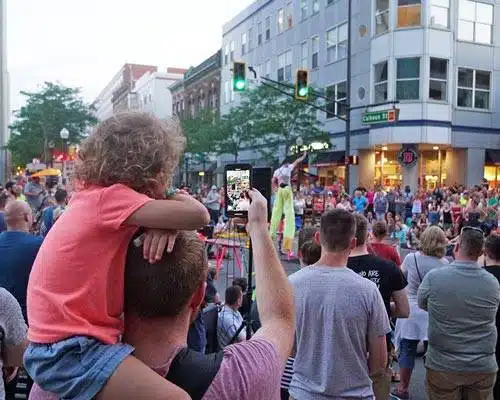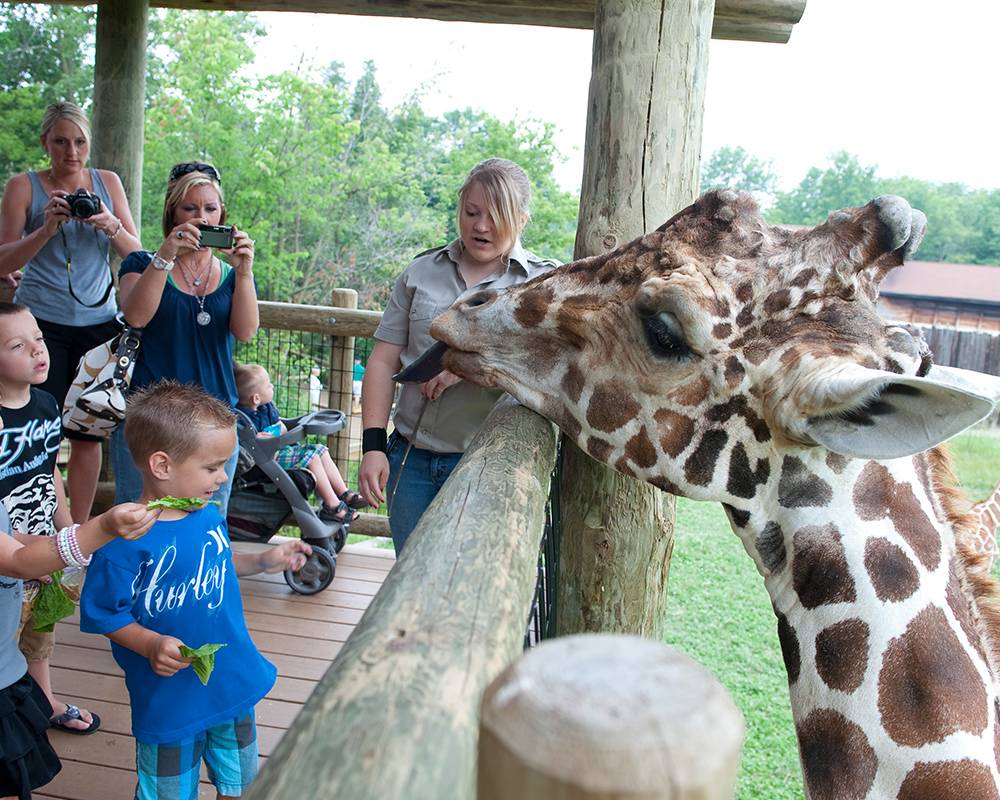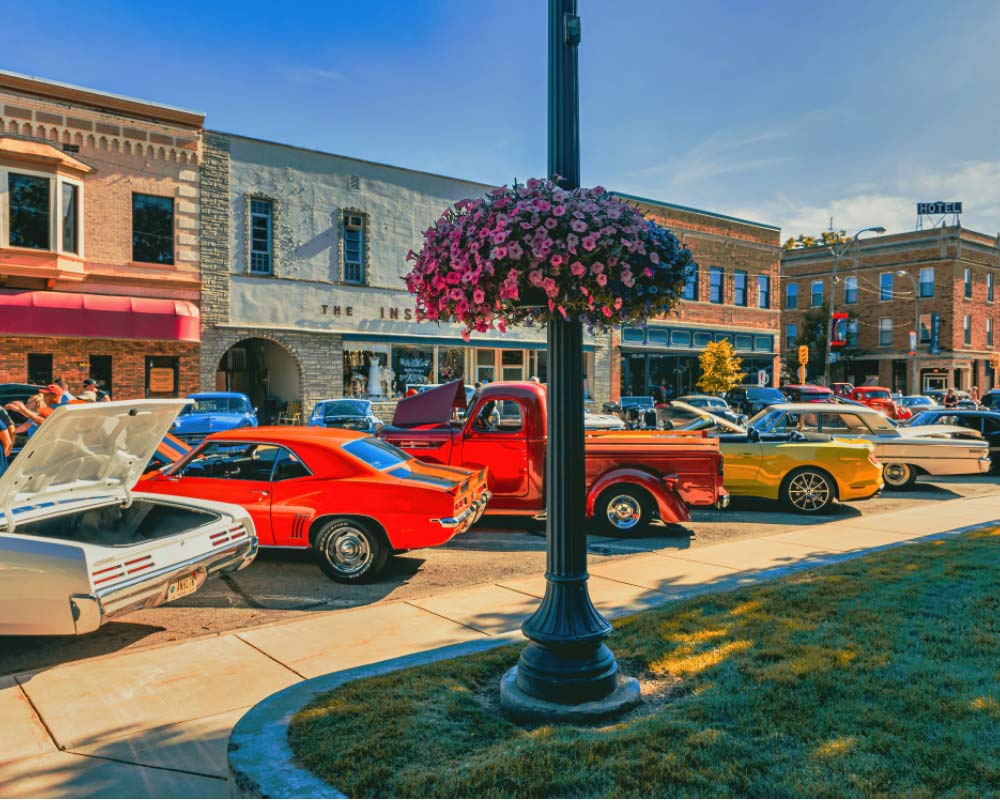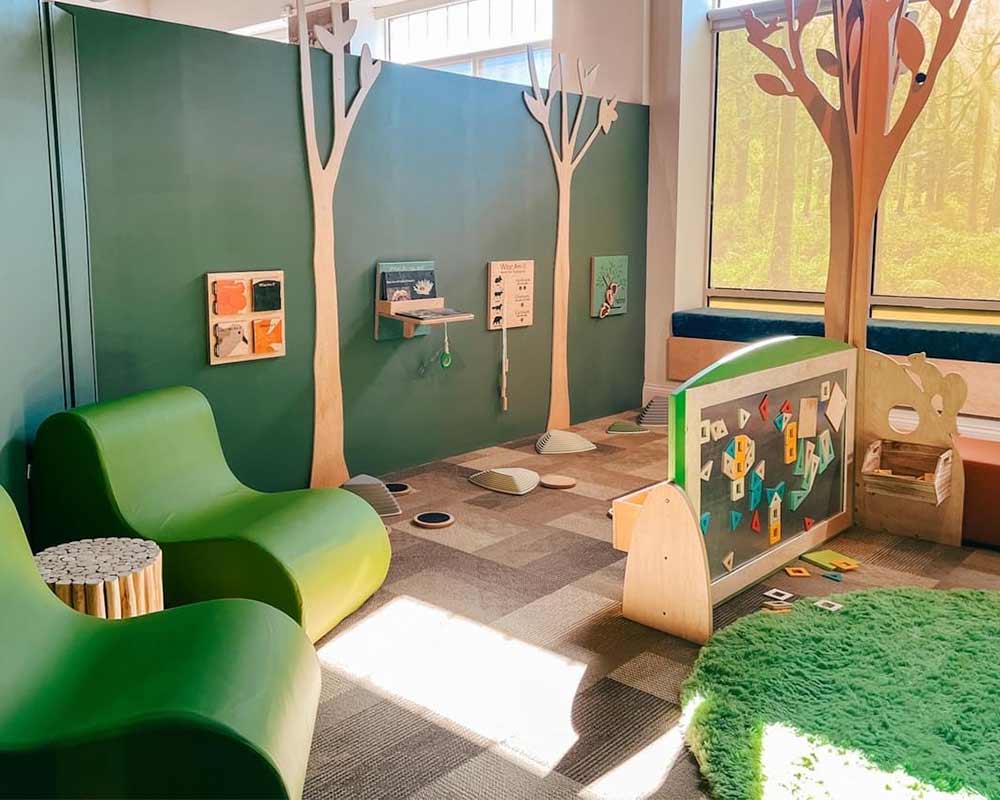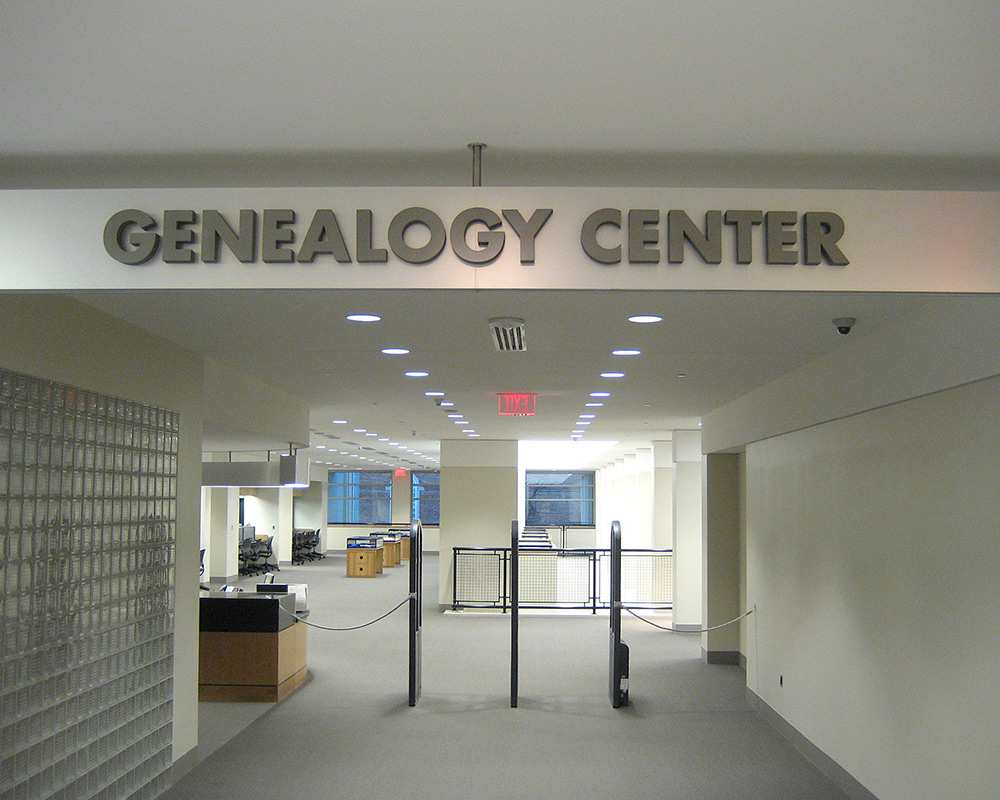“Wear comfortable shoes.”
That friendly piece of advice, posted on the website of the Genealogy Center at Allen County Public Library in downtown Fort Wayne, is a clue to what’s in store for visitors: A collection so vast that it inhabits a space equal in size to a football field. Only the famed LDS genealogical library in Salt Lake City is larger.
“I believe in each of us there is a longing to know our stories,” says Curt Witcher, the nationally recognized genealogist who’s managed this Fort Wayne gem for 34 years. “Our primary task – and we don’t really view it as a task because we love doing it so much – is to help people succeed in discovering their family stories.”
To that end, his team of seven professional genealogists help novices and seasoned researchers alike to navigate the sprawling facility that welcomes 100,000 visitors each year from across the U.S. and beyond. The caliber of staff; the quality and breadth of both physical and digital collections; and unwavering community support that began long before genealogy exploded in popularity, add up to the Center’s national reputation for excellence.
Ahead of its Time
So, how did Fort Wayne become a mecca for family researchers?
The idea first took shape in the mind of a 1960s Fort Wayne library director named Fred C. Reynolds.
“He was somewhat alarmed when he looked around the country and saw that genealogy researchers were being treated like second-class citizens,” explains Witcher. “A lot of libraries weren’t set up to accommodate ‘power users,’ which is what genealogists are – amateur historians. These folks don’t just come to a library seeking one specific thing and then leave. They settle in and keep digging.
“So, mid-century, Fred made it his mission to build a genealogist-friendly library. It was like putting a match to dry wood – it grew like wildfire. All sorts of groups in Fort Wayne donated books to support the collection, groups like the DAR (Daughters of the American Revolution) and Fort Wayne Women’s Reading Club. They recognized the importance of people being able to research their family histories.”
The size and quality of the genealogy collections grew, along with staff expertise, and the community funded the $65 million facility housing it. Today, the Center boasts 1.2 million items in its physical collection and provides access to a long list of databases, many of them licensed and only available inside certain libraries. The Center is especially well known among researchers for its Periodical Source Index, which subject indexes more than 10,000 titles of genealogical and historical periodicals published since 1800.
Fort Wayne Loves its Library
Without community support, this feather in Fort Wayne’s cap – a feather that indirectly generates $6 million of economic impact each year (pre-pandemic) – would not exist.
“Like most local libraries, we’re supported by local taxpayers,” Witcher says. “This community loves its library.”
Because it serves people from across the U.S. at no charge, the Genealogy Center is a gift from Fort Wayne to the entire country.
“When people hear about us, they sometimes say, ‘How nice for Indiana citizens to have such good resources.’ And it is nice for Indiana citizens,” says Witcher. “But it’s just as beneficial to citizens of Florida or California or Ireland, for that matter.”
All visitors use the collections and services at no charge, including consultations by appointment with genealogists on staff.
“There are no barriers to using our resources, whether you live here or across the world,” says Witcher. “The only cost is dimes for making copies on a machine.”
Even during the worst of the pandemic, the Center’s influence was felt widely.
“More than 30,000 people ‘attended’ the 150 virtual presentations we gave in 2021,” notes Witcher.
Because the Genealogy Center attracts people from out of state, it partners with Visit Fort Wayne to help folks make the most of their stay in the city.
“We cherish that partnership,” says Witcher. “A lot of people are not very familiar with Fort Wayne and are surprised to see how much we have to offer here.”
Visit Fort Wayne provides genealogy visitors with a package containing items like a notebook for their research and information about assets near the downtown library – hotels, restaurants, theaters, museums, shops and parks along the riverfront.
Super Sleuths
At the heart of the Genealogy Center is Witcher’s team of super-sleuth genealogist librarians.
“Each member of our team not only has broad and deep expertise in the field of genealogical research, but also specialty areas such as ‘Irish and British lineage’ or ‘people of color in North America,’” he says. “One person is an expert on how to use DNA results in your search. And what’s really exciting to me is that, if we don’t know something, we can find out who does know it because we’re so well connected with other specialists in the field across the country.”
Among items in the massive physical collection are city directories, passenger lists, maps, periodicals, U.S. Census lists, military records and more.
The digital database collection includes free use of several commercial sites like Ancestry.com and FindMyPast.com. A visit to the library is an ideal way to test drive brands before committing money to a personal subscription.
Some people ask why a Genealogy Center is needed in this digital age. Can’t we just find everything we need online from home?
“The resources available publicly online are like the very tip-top of an iceberg,” Witcher explains. “There’s a whole world of resources below the surface that aren’t yet digitized and won’t be within our lifetimes. It’s just too large. And many important databases that are digitized are accessible only through libraries like ours that have special licensing agreements.”
The Boom
When the popularity of family research exploded in the 21st Century, Fort Wayne’s Genealogy Center was already well-positioned to handle it. The boom was fueled by several factors, including the rise of the Internet and the digital companies it spawned.
Witcher had an up-close view of the exponential growth in the popularity of his field. On the cusp of its explosion, he was made a Fellow of the Utah Genealogical Association in 1995, an honor awarded to just one person each year in recognition of their contributions to the field of genealogy.
“It took Ancestry.com about six years in the late 1990s to earn its first $1 million,” says Witcher. “Now it’s valued at $4.6 billion. Instead of being run like a non-profit, real money was spent, for the first time, on marketing the concept of genealogical research.”
TV shows like “Finding Your Roots,” “Genealogy Roadshow” and “Who Do You Think You Are?” have familiarized people with tools used to trace family lines. Viewers vicariously share in the thrill of discovery and become more curious about their own ancestors. And even if they start with little more than their grandparents’ names, they can learn to puzzle out where they came from.
“Almost without fail, every person who comes through our door learns something about their family that they didn’t know before,” says Witcher. “It’s so exciting for us to watch them as the lightbulb goes off and they have that ‘aha!’ moment and learn how to put pieces of information together. We librarians just love that. Connecting people with meaningful information is the heart of what we do.”
Novices and seasoned researchers alike can feel at home in the Genealogy Center, says Witcher; beginners need not be intimidated by the mammoth collection.
“It all begins with one question,” he says. “What is it you’re trying to learn?”
Some people worry they’ll discover something shameful in their family histories. Others may be adopted and wonder if genealogy has any value for them.
“Your family history doesn’t have to be your bloodline, it can be your heartline,” says Witcher. “It’s perfectly fine, exciting and informative to research the ancestry of the family in your heart – the family that raised you, or to research only Mom’s line if Dad is not in your life. Every family story has twists and turns in it. One thing we know for sure: There’s no such thing as a ‘normal’ family.”
Learn more, sign up for a newsletter and find a list of upcoming virtual presentations at genealogycenter.org. ❚
